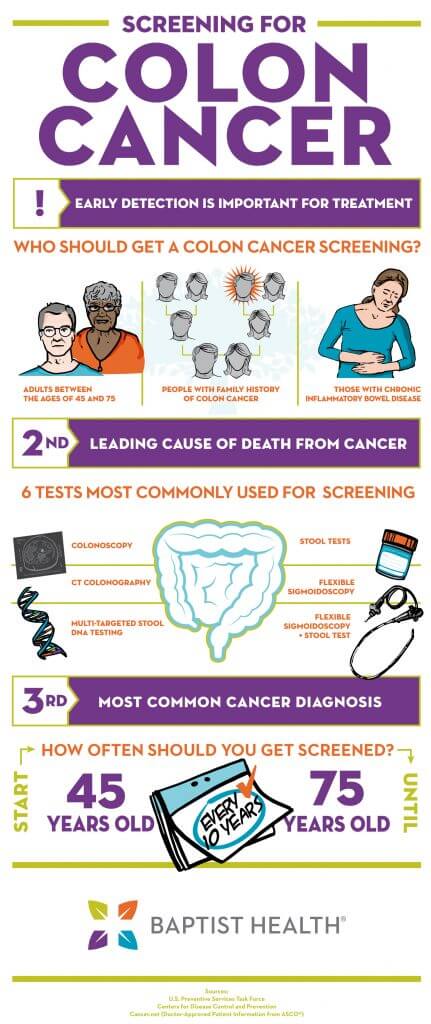Know When to Get a Colon Screening

Regardless of whether or not you have signs or symptoms, it’s recommended by the U.S. Preventive Services Task Force that all adults between the ages of 45 and 75 get a screening for colon cancer. Colon cancer is the third most common cancer diagnosis and the second leading cause of death from cancer. Screening — and getting early treatment if cancer is found — reduces your chances of dying from colon cancer.
For those with a family history of colon cancer, or those who suffer from chronic inflammatory bowel disease, colon screening is sometimes recommended as early as 45 years of age.
What Is Colon Cancer Screening?
A screening test is used to identify potential problems before you start having symptoms, which, for colon cancer, often means the cancer has been growing for some time. Overwhelmingly, colon cancer usually develops from precancerous polyps that grow in the colon or rectum. By screening, your doctor can find and remove precancerous polyps before they become cancerous. Screening also helps catch colon cancer in its early stages, when treatment is most effective.
What Are the Most Common Colon Screening Tests?
When screening for colon cancer, there are six tests that are most commonly used:
- Colonoscopy. A colonoscopy lets the doctor look inside the entire rectum and colon while the patient is sedated. A flexible, thin tube called a colonoscope is inserted into the rectum, allowing the doctor to identify any abnormal tissue or polyps that may be present. During this procedure, tissue and polyps may be removed for further examination in a biopsy. For a person without a family history of colon cancer or polyps, a colonoscopy is recommended every 10 years after age 45.
- Stool tests. In this test, a stool sample is sent to a lab and checked for the presence of blood, which can be an indicator of colon cancer or of noncancerous growths that can become colon cancer.
- Flexible sigmoidoscopy. Like a colonoscopy, a thin, flexible tube is inserted into the rectum and lower (sigmoid) colon to search for any abnormalities. This procedure is less invasive than a colonoscopy and can be done without sedation. It also allows the doctor to remove polyps, which can help prevent colon cancer. If polyps or cancer are found during the flexible sigmoidoscopy, a full colonoscopy is recommended to view the entire colon.
- Flexible sigmoidoscopy combined with a stool test. These tests, which are both detailed in this section, are less invasive than other screenings.
- Multi-targeted stool DNA testing. In addition to checking for the presence of blood, a patient’s stool is tested for DNA mutations that can be an indicator of abnormalities. If abnormalities are found, a colonoscopy will be recommended.
- CT colonography. This procedure uses x-rays called Computed Tomography to take a series of pictures of the colon. A computer then puts the pictures together to create detailed images that may show abnormalities on the inside surface of the colon.
How Often Should Those Over the Age of 45 Get Screened for Colon Cancer?
If you are 45 years of age and have already had a negative screening for colon cancer, you should be screened every 10 years. After the age of 75, talk with your doctor about how often you need to be screened.
The only way to know for certain if you have colon cancer is to see a doctor. Don’t put off your cancer screening — the earlier you catch colon cancer, the better your prognosis is likely to be. The risk of colon cancer increases dramatically with age. Take our colon cancer risk assessment to estimate your personal risk of developing colon and rectal cancer.

Learn More About Your Colon Cancer Risk and Find a Provider with Baptist Health
Assess your health and colon cancer risk with our free online assessment. Find a provider near you via our online provider directory.
Next Steps and Useful Resources
Find a Provider
Take Our Free Colon Cancer Risk Assessment
Everything You Should Know Before You Schedule Colonoscopy
Colon Cancer Hotspots: Important Things to Watch Out For


